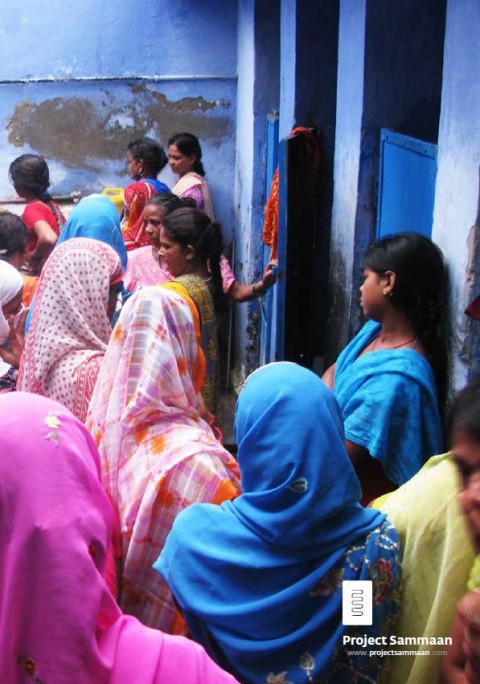This library entry contains background documents for a grant that Mushfiq Mobarak and Kevin Shane are leading and which is funded by the Bill and Melinda Gates Foundation.
Further information and a discussion is available on the SuSanA discussion Forum, see link below.
Short description of the project:
This is an urban infrastructure project that seeks to design and build improved sanitation facilities in the cities of Bhubaneswar and Cuttack in the state of Orissa in India.
It provides a new, holistically re-imagined model for urban slum sanitation facilities in India reviewing:
- Business models
- Architectural designs
- Communication interventions
- And facility operation models.
A total of 119 toilet facilities will be built and evaluated in Bhubaneswar and Cuttack in 2013-14. More than 24,000 persons are expected to directly benefit from this (200 per facility).
The hardware design process, which comprises of designs for the physical infrastructure of public toilets, community toilets – Base Layer and community toilets – Enhanced Layer, will include 18-24 unique facility designs that incorporate better ventilation, lighting, landscaping, etc. to improve the overall user experience.
Additionally, in order to understand the impact of different management models on usage and maintenance, community toilets are randomly assigned to a privately or community management structure.
In addition, to identifying a solution that will produce the most attractive, sustainable and hygienic alternatives to open defecation for slum residents, the program will test a variety of complementary household-level interventions, such as discount coupons for community toilet facilities and varying the pricing structure (monthly passes vs. pay-per-use), etc. The study also incorporates a program of demand generation activities in a subset of communities around community and public facilities. These activities will be used to help communities notice the problems associated with open defecation and develop community cohesion to sanction it.
Goal(s):
The goal of the project is to provide a replicable model of improved sanitation for urban slums that get used and sustained.
Hardware Challenge:
- Design facilities that people want to use
- Design facilities that adequately address unique sanitation needs
? Are complementary services, such as bathing and defecation stalls, cost-effective and do they drive adoption?
Software Challenge:
- Facility level: design facility management systems that ensure sustainability
o Should toilets be run by professionals or communities?
o Do community managed facilities correlate with higher toilet take up than private managed facilities within a one year time period?
- Behavioural Challenge: design household and community behavioural interventions and marketing to encourage use
? Can we make toilet use a habit?
o Multiple factors influence an individual's decision to practice open defecation. For some individuals defecation in the open is a well-established habit. The habit formation intervention component of this study aims to increase healthy sanitation practices by creating new habits, replacing the old ones. The study plans on doing this by using subtle clues and hints to form new habit routines and reinforcing the new routines with rewards.
? Do time-delimited subsidies correlate with toilet take up more than non-time delimited subsidies over a one year time period?
Objectives and Results:
Objective 1: To develop an innovative, sustainable, scalable urban community sanitation model which will reduce the incidence of open defecation and improve health among the urban poor in the implementing partner cities of Bhubaneswar and Cuttack.
To-date Results: The architectural drawings for the facilities (on a site-specific basis) have been created, the Operations and Maintenance (O&M) guidelines and training manual are drafted, and the tendering process for the first batch of toilet facilities is underway.
Objective 2: Create a “toolkit” for successful urban sanitation infrastructure and management interventions based on the implementation and a rigorous evaluation of the project in two cities and disseminate the toolkit broadly through multiple channels.
To-date Results: The framework for the toolkit has been developed and is currently being populated with project-specific details by workstream. Learnings and insights will continue to be added to this work-in-progress document as the project progresses.
Objective 3: Engage in advocacy to encourage adoption, scale-up and replication of these innovations beyond our intervention sites and throughout cities in Orissa and India.
To-date Results: Capacity-building exercises with the local municipal corporations, as well as demand generation activities with the host communities continue to take place as the project prepares for construction.
Research or implementation partners: The Abdul Latif Jameel Poverty Action Lab (J-PAL), Quicksand
Start and end date: January 1st, 2012 – March 31st, 2014
+++++++++++
Documents available for download below:
1 - Project newsletters
2 - Short presentation during webinar on 7 November 2013
3 - Poster "Does sanitation behavior migrate?" at the FSM3 Conference in Hanoi, January 2015
Bibliographic information
Mobarak, M., Shane, K. (2013).
Communal sanitation solutions for urban slums Various documents on results from research grant Institute for Financial Management and Research, Chennai, India
Filter / Tags
Fundamental research and engineeringUrban (entire city)Urban informal settlements (slums)English
External links
Further information on discussion forum
Downloads
1a - Project Newsletter Feb. to March 2013
Download
Type: application/pdf
Size: 0.54 MB
1b - Project Newsletter March to April 2013
Download
Type: application/pdf
Size: 0.59 MB
1c - Project Newsletter May to June 2013
Download
Type: application/pdf
Size: 0.81 MB
2 - Short presentation during webinar on 7 November 2013
Download
Type: application/pdf
Size: 1.67 MB
3 - Poster "Does sanitation behavior migrate?" at the FSM3 Conference in Hanoi, January 2015
Download
Type: application/pdf
Size: 0.21 MB

Published in: 2013
Pages: 0
Publisher:
Institute for Financial Management and Research, Chennai, India
Author(s):
Mobarak, M., Shane, K.
Uploaded by:
Location of library entry:

